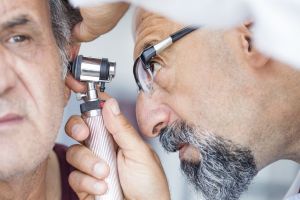Think of your audiologist as a tailor for your sense of hearing. Just as one person’s height and weight differ from another, so does hearing loss. Wearing custom-fit hearing aids increases the likelihood you will hear better, be comfortable wearing them all day and experience enhanced quality of life. Audiologists and hearing instrument specialists are trained to recommend the perfect hearing aids for you by considering your hearing loss, preferences and lifestyle.
Prescribing hearing aids for your hearing loss

ability, preferences and lifestyle to
prescribe hearing aids for you.
Audiologists and hearing instrument specialists prescribe hearing aids programmed to fit your specific hearing loss. That’s why it’s important to have a thorough hearing evaluation by a qualified hearing care professional. The evaluation tests your degree of hearing loss across a range of pitches. The results are plotted on an audiogram (a diagram of your hearing loss), which provides an illustration of your hearing ability.
Based on your audiogram, your hearing care professional will recommend different hearing aid features that will work best for you. Not all hearing loss is created equal — and not all hearing aid models are designed to address every type of hearing loss. For example, if you have a severe hearing loss, sometimes known as profound hearing loss, you will do best with hearing aids that have digital noise reduction and a sophisticated feedback management system. Your practitioner will also determine whether you need one or two hearing aids. Audiologists usually prescribe two hearing aids if there is a hearing loss in both ears because the ears work together with the brain to collect and process sound. Binaural hearing makes it easier to locate sound, understand speech and increases the perception of volume.
Making sure your hearing aids match preferences
Much like noses, ears come in all shapes and sizes. So do the various types of hearing aids. Your audiologist will make sure your devices provide the quality of sound you want to hear and fit securely and comfortably within your ear.
Some people prefer to have hearing aids that are as small as possible. There are often trade-offs that come with small sizes. For example, completely-in-the-canal (CIC) models are quite discreet because they tuck into the ear canal, but they use smaller batteries that require more frequent changes. Also, these smaller devices may not have room for external volume control and program buttons.
Others prefer larger hearing aid models that are easier to handle and clean. Behind-the-ear (BTE) hearing aids are more visible to others because they sit behind the earlobe and connect to an earmold in the ear. However, this type of hearing aid can house a larger circuit and therefore provide more features than other models. They have larger batteries that last longer and can accommodate an external volume control, a button to switch programs and even an on/off switch if desired.
Once you are fitted with your hearing aids, be prepared to have them adjusted a few times. The hearing care practitioner’s office may not be a good representation of your everyday listening environment. While you’re out and about wearing your new hearing aids, take notes about what is working and what still needs adjusting. Be as detailed as possible at your follow-up appointments. Your feedback is critical in helping your hearing care professional adjust your devices to meet your preferences.
Asking questions about your lifestyle and budget
Your lifestyle and budget are important to finding a good fit, too. You may have a budget that allows you to get more bells and whistles than you need, or you may be in search of the best bargain for the price you can afford. If price is an obstacle, ask about financial assistance and financing options.
In addition to discussing your budget with your audiologist or hearing instrument specialist, expect to have a frank discussion about your lifestyle and your expectations for the hearing aids. When you describe your lifestyle, consider the activities and experiences you’d like to enjoy, as well as the ones you currently enjoy. Based on the information you provide, your hearing care professional will be able to help you select the best hearing aids for the life you lead.
Just as a custom-made garment makes you look and feel your best, wearing hearing aids does all of that and more. Studies indicate treating hearing loss can help you stay healthier, live longer and experience a better quality of life. Search our directory of hearing centers to find a qualified professional who can tailor a treatment plan for you.
